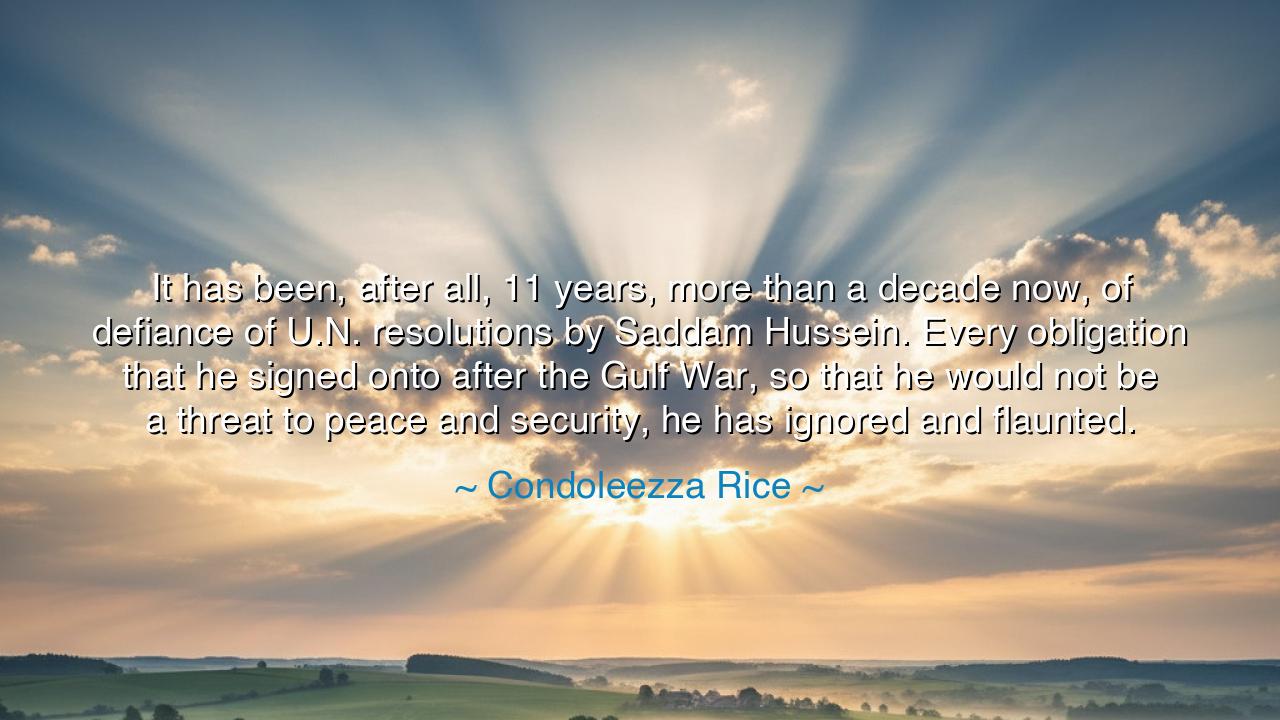
It has been, after all, 11 years, more than a decade now, of
It has been, after all, 11 years, more than a decade now, of defiance of U.N. resolutions by Saddam Hussein. Every obligation that he signed onto after the Gulf War, so that he would not be a threat to peace and security, he has ignored and flaunted.






Hear the words of Condoleezza Rice, spoken in the shadow of war and history: “It has been, after all, 11 years, more than a decade now, of defiance of U.N. resolutions by Saddam Hussein. Every obligation that he signed onto after the Gulf War, so that he would not be a threat to peace and security, he has ignored and flaunted.” These words were born in the tense days before the Iraq War of 2003, yet their meaning is eternal: that when one defies the solemn covenants of nations, mocking agreements sworn for the sake of peace and security, the trust that binds the world together begins to unravel.
The meaning is twofold. On one level, Rice spoke of Saddam Hussein’s repeated violations of international law, his refusal to abide by the agreements set after the Gulf War of 1991. These obligations were designed to restrain him, to keep his power from endangering others. Yet in choosing defiance, he set himself not merely against one nation, but against the collective voice of the world. On a deeper level, her words echo the wisdom of the ancients: when a man or ruler despises his own oaths, he corrupts the very essence of order and invites judgment upon himself.
History is filled with such examples. Recall the tale of the Trojan War. After Paris broke the sacred code of hospitality and carried Helen to Troy, the oaths sworn between kings collapsed. The Greeks gathered in wrath, not only for Helen’s sake, but because the violation of sworn promises had poisoned the bonds of trust among nations. Troy’s defiance brought not glory but ruin, just as Rice warns that Saddam’s flaunting of obligations endangered the fragile balance of peace in his own age.
Nor is this lesson confined to ancient myth. In modern times, Adolf Hitler signed treaties of non-aggression, only to shatter them when it suited his ambition. His defiance of these covenants plunged the world into its darkest war, proving again that when rulers mock their obligations, millions suffer. Rice’s warning was cut from the same cloth: history shows us that those who consistently despise their agreements cannot be left unchecked, for their contempt spreads chaos.
But Rice’s words also carry a deeper human truth, meant not only for nations but for individuals. How many friendships have been destroyed, how many families broken, because one party repeatedly ignored and flaunted their promises? Trust, once given, is sacred. To betray it again and again is to declare war not only upon others but upon peace itself. The unfaithful friend, the dishonest partner, the ruler who mocks treaties—all walk the same path of ruin, though on different scales.
The lesson is clear: the strength of both nations and individuals lies in the keeping of promises. Peace and security are not upheld by force alone, but by honor, by fidelity to one’s word. To defy obligations is easy; to keep them requires discipline, humility, and respect for others. A nation that honors its covenants is respected, just as a person who honors their word is trusted. But the one who flaunts his promises invites suspicion, division, and finally destruction.
Therefore, let this wisdom be passed down: keep faith with your promises, whether in great matters or small. If you bind yourself by oath—whether before God, before a friend, or before a community—then honor it with integrity. And when others repeatedly mock their obligations, know that peace cannot stand upon such ground. In your life, be the one whose word is iron, not straw. For only thus will you build true peace and security, both in your household and in the world.






THthanh hoang
This comment reflects the tense atmosphere of the early 2000s, but I can’t help but think about how differently we view such conflicts now. With hindsight, many people question whether the information used to justify intervention was complete or accurate. It makes me wonder how much public trust is lost when governments make decisions based on partial truths. How do we rebuild faith in global institutions after that kind of disillusionment?
TKDinh Tán Khoi
I can understand the frustration behind this viewpoint, yet it also highlights a recurring flaw in global governance—rules without consequences rarely work. Still, it makes me question the effectiveness of the U.N. system itself. If compliance depends on voluntary cooperation, does that make the U.N. more symbolic than practical? Maybe the real issue isn’t just Saddam’s defiance, but the structural weakness of international law enforcement.
NKNguyen Khanh
The statement feels like a justification for action, but it also raises moral and political questions. Was every diplomatic avenue truly exhausted before resorting to force? Sometimes I worry that invoking ‘defiance of U.N. resolutions’ becomes a rhetorical tool for legitimizing intervention. How do we ensure accountability for both the aggressor and those enforcing international law, especially when motives may be mixed with national interests?
ATVan anh Tran
This quote makes me think about the limits of international diplomacy. If a nation repeatedly ignores U.N. resolutions, at what point does dialogue become ineffective? It’s troubling that global institutions seem powerless when states act unilaterally. I wonder whether the problem lies in enforcement mechanisms or in the political will of member nations. Should the U.N. have stronger authority to intervene, or would that risk overstepping sovereignty?